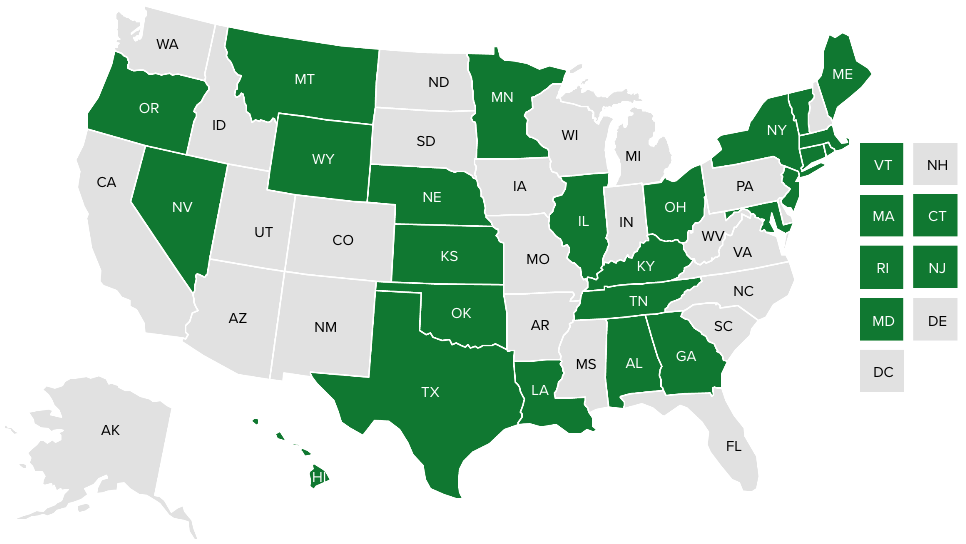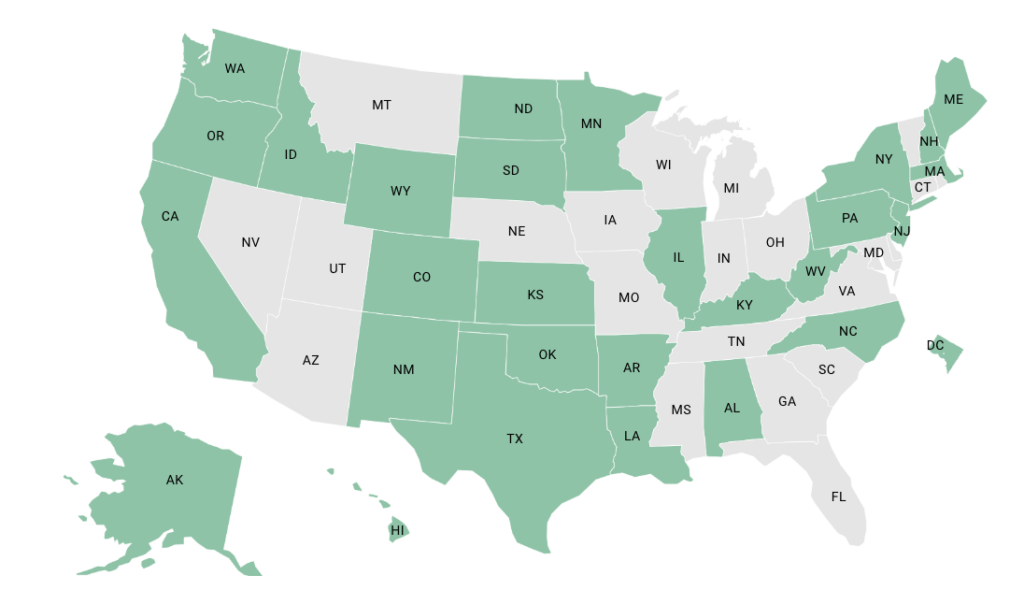This information was collected through a combination of state surveys and NASHP staff research. It offers a snapshot of how the state is defining, training, certifying, and paying for the CHW workforce — as well as how the state is developing cross-agency and state-to-local strategies to improve community health in partnership with CHWs.
This is a dynamic policy space, and states are continuing to develop new approaches. We will continue to make periodic updates to this page. Learn more about state CHW policies across the U.S.
State CHW Definition
Kentucky’s certification manual uses the APHA definition of CHWs. HB525 uses the following: “WHEREAS, community health workers are frontline health workers with a uniquely close relationship to and understanding of the community they serve; and WHEREAS, community health workers serve as a liaison between patients, their healthcare providers, social service providers, and the community; and WHEREAS, community health workers facilitate improved communication between patients and their healthcare providers, help patients learn to effectively comply with medical care instructions, improve the quality and cultural competency of service delivery, and educate patients to improve healthy behaviors.”
Certification and Training
The Kentucky Department for Public Health (KDPH) launched the statewide optional competency-based certification process in 2019. CHW reimbursement through Medicaid requires CHWs be certified through the Kentucky Office of CHWs (KOCHW).
Kentucky has two certification tracks: certification based on training and mentorship, and certification based on experience. The KOCHW webpage, the CHW Certification Manual, CHW Certification Two-Pager, and the CHW Certification Webinar slides all provide additional information.
Starting in 2024, any individual who wishes to become certified through the “training and mentorship” track must complete a training program approved by KOCHW.
In addition to providing the official statewide certification, KOCHW reviews and approves continuing education units for CHWs in Kentucky.
KOCHW provides CHW supervisor roundtables to engage and support CHW supervisors across the state.
Medicaid Reimbursement
Kentucky Medicaid reimburses for CHW services under its State Plan. A State Plan Amendment authorizing reimbursement was approved and went into effect on July 1, 2023. To be eligible for CHW reimbursement, a CHW must be certified by the Kentucky Office of CHWs and be employed at a Kentucky health facility that has a billing relationship with Kentucky Medicaid. CHW services must be ordered by a physician, physician assistant, nurse practitioner, certified nurse midwife, or dentist.
Billing codes include:
CPT 98960
- 1 patient
- $22.53 per 30-minute increment
CPT 98961
- 2–4 patients
- $10.88 per patient, per 30-minute increment
CPT 98962
- 5–8 patients
- $8.03 per patient, per 30–minute increment
MCOs will reimburse for CHWs. Payments are determined by the MCO via a contract with the provider. They may also hire CHWs. Community-based organizations are not currently eligible for reimbursement for CHW services.
Other Funding or Financing Mechanisms
The Kentucky State Cabinet for Health and Family Services is a grantee of the CDC Community Health Workers for COVID Response and Resilient Communities (CCR) initiative. The funds support programming to increase the number of CHWs in priority areas of the state while also improving communication and training for CHWs.
CHW programs across Kentucky may be supported by other federal grants from the CDC, HRSA, or other partners.
Key Partnerships
The Kentucky Office of CHWs (KOCHW), housed within the Kentucky Department of Public Health, exists to support, strengthen, and sustain the CHW profession in Kentucky. KOCHW convenes the CHW Advisory Workgroup, which brings together partners from across the state to collaborate, network, discuss challenges, and share resources.
The Kentucky Association of Community Health Workers (KYACHW) was founded in 2016 and exists to unify, sustain, and promote the CHW profession within the Commonwealth of Kentucky. KOCHW and KYACHW work together to support each other and strengthen the CHW profession across the state.
KOCHW collects data on the CHW profession through certification and annual workforce surveys aligned with common indicators.
State CHW Legislation
In 2022, HB525 passed, requiring Medicaid to submit a plan for reimbursing CHW services.
Legislation was passed in 2022 regarding certification and education requirements. Kentucky Revised Statutes 309.460, 309.462, and 309.464 outline the statutory requirements regarding CHW certification, continuing education, certification renewal and the duties of the Department for Public Health.
Kentucky Administrative Regulation (KAR) 902 KAR 21:040 authorizes the Department for Public Health to promulgate administrative regulations for the certification of CHWs. The regulation details the CHW core competencies; application process; eligibility requirements; certification renewal; renewal extensions; continuing education requirements; scope of practice; complaint procedures; and denial, suspension, and revocation of a CHW certification.
Medicaid legislation can be found at KRS 205.648 and 907 KAR 3:310.
State Resources
State Overviews
ACO – Accountable care organization
AHEC – Area Health Education Centers
APHA – American Public Health Association
APM – Alternative payment model
CBO – Community-based organization
CDC – Centers for Disease Control and Prevention
CDC CCR Funding – Community Health Workers for COVID Response and Resilient Communities Funding
CHR – Community health representative
CHW – Community health worker
CPT Codes – Current Procedural Terminology Codes
C3 Project – CHW Core Competency Project
FFS – Fee for services
HCSPCS Codes – Healthcare Common Procedure Coding System Codes
HRSA – Health Resources & Services Administration
MCO – Managed care organization
NACHW – National Association of Community Health Workers
SDOH – Social determinants of health
VBP – Value-based payment
State CHW Definition: This category indicates where states have a formal definition of a CHW. In some cases, where there is not a definition in statute, this category may draw information from provider manuals and state websites or reports.
Certification and Training: This category includes information about how CHWs are trained in the state, which entities provide training, whether or not the state runs or recognizes a CHW certification program, and information about the entities that administer existing certification programs.
Medicaid Reimbursement: This category includes information about state Medicaid strategies that provide enrollees access to CHW services. Entries indicate whether state Medicaid programs currently reimburse for CHW services or incorporate CHWs into alternative payment models under the authority of a state plan amendment (SPA), or where states have earmarked funds to support CHW services under the authority of an 1115 demonstration waiver. It also indicates where CHW services might be supported through managed care approaches (e.g., where MCOs are paying for CHW services using administrative dollars or where states are using managed care contracts to incentivize or require MCOs to cover CHW services).
Other Funding or Financing Mechanisms: This category includes information about other state funding or financing approaches that cover CHW services or CHW positions. It includes information about federal grant dollars for which the state is the grantee.
Key Partnerships: This category offers information about key partners outside state government, including state CHW associations and CHW training entities, and highlights formal cross-agency partnerships within the state that support alignment of funding and resources for the CHW workforce.
State CHW Legislation: This category highlights any state legislation relevant to the CHW workforce. This might include statutory language directing agencies to develop a Medicaid reimbursement approach, laws that established state CHW certification, or other relevant statutes.
State Resources: This category offers links to any key reports or resources that states elected to highlight as critical to CHW policy and partnership.



